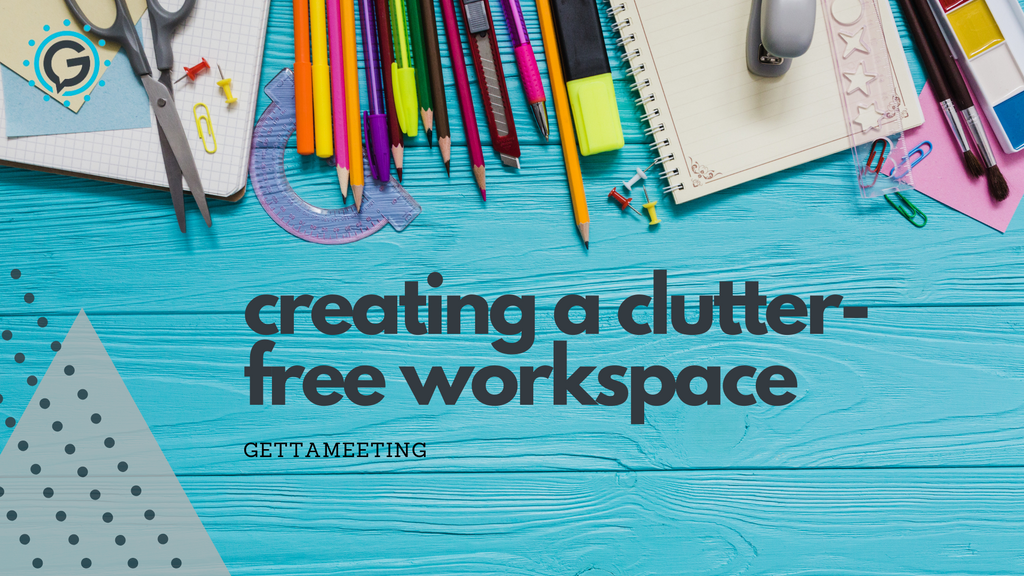The National Association of Professional Organizers claims we spend an entire year of our lives searching for lost items! Not only do we lose time when we work among clutter, but we also suffer psychological, social and physical losses.
The problem of clutter even created National Pack Rat Day (celebrated on May 17th) which brings awareness to the human-like nature of pack rats to collect many items over time without purging their collection. Holidays like these can remind us to dive into cleaning, starting by decluttering our workspaces.
The Dangers of Clutter
Cluttered spaces negatively affect our anxiety and stress levels. Clutter is known to make us feel anxious, stressed, or even depressed, which are huge prerequisites to early burnout. An overwhelming amount of clutter also tends to lead employees to procrastinate as avoidance and coping strategies are triggered in cluttered environments.
Working in a cluttered space also affects the social aspects of our jobs. Clutter can cause us to make poor decisions and, in turn, strain our work relationships. According to Harvard Business Review, relationships are negatively affected by clutter because folks with messy desks are often perceived to be "less conscientious, more neurotic and less agreeable" which affects how team members interact with them.
Having a clutter-free office is also integral to successful customer relationships. We must establish a welcoming place for customers and potential clients so that we can foster positive impressions and experiences.
Not only does clutter affect our mental and social wellness, but we also suffer physically. When people spend time in cluttered spaces, they are more likely to make poor eating choices, and extremely cluttered homeowners are 77% more likely to be overweight. Absence is a major problem that not only employees, but companies too suffer from. Because clutter leads to higher levels of burnout and higher risk of illness, absenteeism is more common in cluttered workplaces. Absenteeism costs businesses $225.8 billion annually in the United States!
All in all, when clutter is cleared from work environments, stress and procrastination drastically decrease. In a clutter-free environment, productivity in the workplace increases because employees are able to better process information and focus as our cognitive resources no longer drain as quickly. To become a strong team with good communication and minimal conflict, clutter cannot live in our office or other workspaces. Lastly, decluttered and sterile workspaces mean less sick days and lower costs.
How to Declutter & Make It a Habit

91% of consumers say they would be more effective and efficient if their workspace was better organized, however, starting to purge items and making it a ritual is often the most difficult part of dropping pack rat tendencies. Here are some helpful ways to make a habit of decluttering regularly:
- Be proactive. If you see something that could become clutter, get rid of it or organize it immediately. Taking a moment now to take care of clutter will pay off in the long run!
- Create sterile practices. Taking care of our environment is crucial to our happiness, health, and productivity. To ensure clutter does not pile up and our workspaces stay clean, dust surfaces and disinfect high-touch areas. Keeping our desks sterile also works to reduce sick days and keep those pesky absences at a minimum.
- Establish boundaries or policies. Communicating a clean-desk policy to govern the tidiness of shared workspaces can help teams stay on top of their clutter and set a tone of quality and consistency in the work environment.
- Clean regularly. Cleaning should not be energy-draining or dreaded. At GettaMeeting, we have a module dedicated to Enhanced Focus which discusses how spending ten uninterrupted minutes a day on something every day can make such an impact in our lives. Consider spending ten minutes at the beginning of your day or ten minutes as a refreshing break to clean your workspace. Again, ten minutes a day saves hours in the long run and stimulates motivation every day.
Final Thoughts + Bonus Tips
Consider organizing a "spring cleaning" day at work including cleaning and organizing supplies plus plenty of pizza and music. Creating joy around mundane tasks is so important if we want to encourage healthy habits that last.
If your workplace functions primarily digitally and there isn't much clutter to clean, consider reaching out to IT to find and utilize tools to help manage online documents.
Lastly, some people love (and can even thrive in) cluttered workspaces. Having documents readily available, meaningful trinkets lining the desk, and tools we use often at arm's length is helpful for some team members. Messy desks can even make us more creative! For individuals who like clutter but might be more productive with fewer knick-knacks in sight, consider replacing clutter with lamps, plants, or fresh scented candles or essential oils. These replacements create a healthier atmosphere that restores attention and efficiency, increases morale, and boosts productivity!
______________________________________________________
Check out our Workplace Productivity series and other meeting modules here!
You might also enjoy:
The Importance of Finding Time to Connect With Your Customers
Mastering Every Meeting Type: A Necessary Guide for Entrepreneurs
